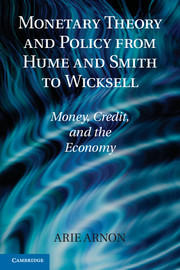Book contents
- Frontmatter
- Dedication
- Contents
- List of Illustrations
- List of Tables
- Preface
- Introduction
- Part one Analytical and Historical Foundations
- Part two Debating Monetary Theory under Inconvertibility
- 5 New Reality
- 6 The Early Round of the Bullion Debate 1800–1802
- 7 Thornton on Inconvertibility and Central Banking
- 8 Ricardo versus Bosanquet
- 9 “Credit Theories of Money” in Exchange and Intermediation
- Part three Debating
- Part four The Road to Defensive Central Banking
- Part five A New Beginning
- Bibliography
- Author Index
- Subject Index
5 - New Reality
The Restriction Period, 1797–1821
Published online by Cambridge University Press: 05 July 2014
- Frontmatter
- Dedication
- Contents
- List of Illustrations
- List of Tables
- Preface
- Introduction
- Part one Analytical and Historical Foundations
- Part two Debating Monetary Theory under Inconvertibility
- 5 New Reality
- 6 The Early Round of the Bullion Debate 1800–1802
- 7 Thornton on Inconvertibility and Central Banking
- 8 Ricardo versus Bosanquet
- 9 “Credit Theories of Money” in Exchange and Intermediation
- Part three Debating
- Part four The Road to Defensive Central Banking
- Part five A New Beginning
- Bibliography
- Author Index
- Subject Index
Summary
The Restriction: An Inconvertible Monetary System
The structure of the British banking system as we described it in Chapter 2 did not change significantly until the end of the eighteenth century. The three types of banks – the Bank of England; the private, non-issuing banks in London; and the many issuing ones in the rest of the country – continued their activities. The number of private banks in London barely changed during this time; there were some fifty to sixty at the midpoint of the eighteenth century and around the same number toward the end of the century, although on average, they grew in size. The number of country banks, on the other hand, increased dramatically, doubling between 1783 and 1793 and continuing to grow until 1813 (Pressnell 1956, p. 11). The banking system faced several financial crises, for example in 1783 and 1793, but managed to deal with each of them so that the system returned to function afterward as it had before. However, one major crisis at the end of the century caused a significant rift in the British banking system.
Although it is often difficult to determine the starting point of a historical process or debate, this is not the case with what is known as the Restriction Period. The Restriction started abruptly with a decision taken by the sovereign on Sunday, February 26, 1797, before the opening of the banks the following day. This decision marked a crucial turning point for money and credit in both theory and practice. The crisis that forced the decision had started a few days earlier on February 18, when, apparently due to rumors of an invasion, people in Newcastle rushed to the banks and converted notes to coins. Some banks in the region suspended payments, and a run on banks in various parts of the country spread quickly. A report that the French had landed in Wales contributed to the pressure in London at the Bank of England, where bullion reserves fell dramatically. The decision made on February 26, taken as an Order in Council, initiated the Restriction.
- Type
- Chapter
- Information
- Monetary Theory and Policy from Hume and Smith to WicksellMoney, Credit, and the Economy, pp. 63 - 72Publisher: Cambridge University PressPrint publication year: 2010



